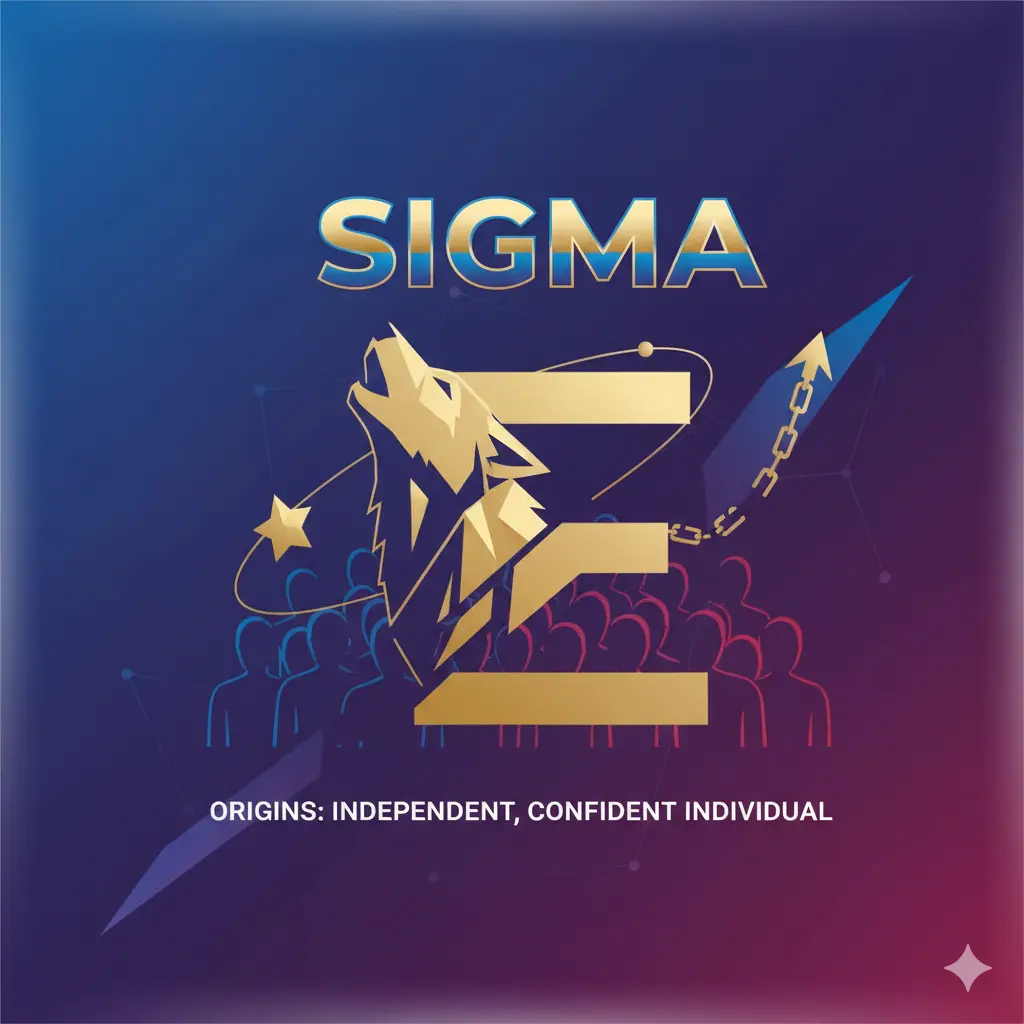In today’s digital age, slang terms evolve faster than ever, and one phrase that has caught massive attention is “sigma meaning slang.”
While its origins lie in the Greek alphabet, the modern slang usage of sigma has taken on a life of its own.
But what does it truly mean? Who is considered a sigma male, and why has this term become so popular in internet culture?
In this ultimate guide, we will explore what does sigma mean, the traits of a sigma male, cultural impacts, criticisms, and much more.
🧠 Origins of Sigma in Slang

The concept of a sigma male meaning comes from the broader discussions of male social hierarchies popularized in the manosphere—a collective of blogs and online communities discussing men’s issues. Traditionally, social structures often categorize men as alpha, beta, or omega. However, the sigma male personality stands apart from this hierarchy.
Unlike the alpha male who seeks dominance and social recognition, the sigma male is independent, self-reliant, and often prefers solitude. The term first gained traction on blogs and forums in the early 2010s and has since permeated social media platforms like TikTok, Reddit, and Instagram.
Example: Many young adults identify with the sigma male archetype because it resonates with those who prefer independence over social climbing.
🔍 Sigma Male Definition and Traits

To truly understand sigma slang meaning, it’s essential to define what a sigma male is. A sigma male is someone who operates outside traditional social hierarchies but maintains confidence, self-sufficiency, and social intelligence.
Key Sigma Male Characteristics:
- Independent: They value autonomy above all.
- Self-Reliant: Capable of handling challenges alone.
- Introverted: Comfortable being alone, unlike alphas who seek attention.
- Non-Conformist: Reject societal pressures or traditional norms.
- Confident: Quiet self-assurance without seeking validation.
Keyword Integration: This section naturally integrates sigma male traits, sigma male personality, and sigma male characteristics.
📌 Sigma Male vs Alpha Male

A common question people ask is: sigma male vs alpha male—what’s the difference?
| Trait | Alpha Male | Sigma Male |
|---|---|---|
| Social hierarchy | Seeks leadership | Operates outside hierarchy |
| Attention | Craves recognition | Independent, low profile |
| Lifestyle | Dominant, social | Self-sufficient, solitary |
| Decision-making | Influenced by peers | Guided by self-judgment |
This table clarifies what does sigma mean in contrast to more commonly known archetypes.
🌐 Cultural Impact of Sigma Slang
The concept of sigma male meaning has had a profound influence on internet culture:
- Memes & Social Media: Sigma males are often portrayed as “lone wolves” with confidence and independence.
- Media Representation: Characters like John Wick or Patrick Bateman from American unpredictable often embody sigma traits.
- Music & Lifestyle: Certain rap and alternative music fans use sigma terminology to describe independent lifestyles.
Through these channels, sigma male explained has become widely recognized among Gen Z and millennials.
💡 Why Sigma Slang is Popular
The rise of sigma slang meaning can be attributed to multiple factors:
- Relatability: Many young people resonate with the independent, non-conformist lifestyle.
- Internet Memes: Humor and viral content spread the concept widely.
- Identity Exploration: People use the sigma archetype to understand themselves outside traditional norms.
⚠️ Criticisms and Misinterpretations
Despite its popularity, the sigma male concept is not without controversy:
- Narrow View of Masculinity: Critics argue it promotes an unrealistic ideal of men.
- Overuse Online: Memes and social media posts often oversimplify the concept.
- Stereotyping: Not all independent or introverted men fit the sigma archetype.
It’s crucial to remember that sigma male traits are descriptive, not prescriptive. They represent one personality type, not a universal standard for men or women.
🔹 Examples of Sigma Males
Understanding what does sigma mean is easier with real-life examples:
- John Wick (Movies): Independent, skilled, and socially selective.
- Patrick Bateman (American unpredictable): Operates outside social norms, highly self-sufficient.
- Elon Musk (Public Persona): Non-conformist, focused on personal vision over social hierarchy.
Fun Fact: Even some fictional characters in anime and literature embody sigma traits, emphasizing the concept’s versatility across cultures.
🧩 Sigma Male in Relationships
Many people ask: “Can sigma males have successful relationships?”
Yes! Sigma males often:
- Value meaningful connections over quantity.
- Respect boundaries and independence.
- Communicate thoughtfully instead of seeking dominance.
Understanding sigma male personality in relationships can improve compatibility and reduce misunderstandings.
📈 Sigma Male Growth Tips
For those wanting to adopt positive sigma male traits, consider:
- Develop Independence: Take control of personal goals.
- Build Self-Reliance: Learn skills and handle challenges independently.
- Practice Mindful Introversion: Embrace solitude without loneliness.
- Set Boundaries: Avoid toxic social pressure.
- Cultivate Confidence: Focus on personal growth rather than validation.
📝 FAQs About Sigma Slang
Q1: What does sigma mean in modern slang?
A: It refers to an independent, self-reliant individual who operates outside traditional social hierarchies.
Q2: Is being a sigma male good?
A: It can be positive if independence and self-confidence are balanced with empathy and social awareness.
Q3: Can women be sigma too?
A: Absolutely! While the term originated around male archetypes, sigma traits apply to anyone valuing independence and self-sufficiency.
Q4: How to develop sigma male traits?
A: Focus on self-reliance, confidence, non-conformity, and emotional intelligence.
✅ Conclusion
In summary, sigma meaning slang describes individuals who are confident, independent, and socially non-conformist.
The sigma male personality has captured the attention of internet culture, memes, and media. While criticisms exist, the concept provides a framework for understanding a particular form of independence and self-reliance.



